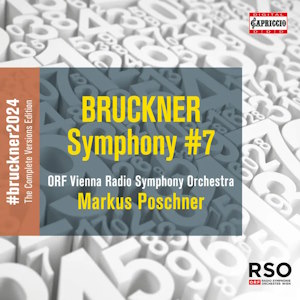
Anton Bruckner (1824-1896)
Symphony No. 7 in E Major (1883, ed. Nowak)
ORF Vienna Radio Symphony Orchestra/Markus Poschner
rec. 2023, Großer Saal, Radiokulturhaus, Konzerthaus, Vienna
Capriccio C8091 [59]
Throughout this ongoing #bruckner2024 series, Markus Poschner’s recordings have for me divided into two distinct camps: those where his predilection for pacier tempi have paid off, and those where it has not. This is decidedly in the latter category; he makes a strange choice in the first movement to accelerate the coda ridiculously, presumably in order to engineer a starker contrast with the finale where the same musical material is employed, but then delivers the finale in such a manner as to make it sound grander than it is. First he pulls the tempi about, then he rams on the brakes with the result that the brass sounds clunky and ponderous. Playing loud and fast the first time and more slowly but again loudly the second simply does not work; both passages might last only a few seconds but the contrast sounds contrived and even silly and was not what Bruckner intended; as such, the finales to both movements fail.
The opening is as broad and sonorous as could be desired but soon haste kicks in; the movement is four minutes faster than two of my favourite versions by Eichhorn and Haitink (VPO, 2019) respectively, and overall seven or eight minutes shorter – that is a lot of music. The pacing and phrasing of the Adagio are unexceptionable, although I have heard more rapt and moving accounts; there is a certain air of perfunctoriness about it compared with those conductors who touch transcendence, especially in the tripping insouciance of the Gesangsperiode. The famous climax certainly makes an impact, but again, I have heard more monumental renderings – and the brass at 17:11 are definitely too coarse and loud. The Scherzo is, unsurprisingly, on the very brisk side; some will find it rushed but it is similar to that in recordings by Eichhorn, Klemperer, Wakasugi, Tennstedt et al. I find nothing objectionable in that and indeed, the Trio is handled very lyrically. The finale, too begins well; it is energised and propulsive, as it should be. In some ways, I feel that with all that blaring circus brass Bruckner was deliberately throwing caution to the winds in producing such an overtly short, bright and breezy finish – it is distinctly humorous in parts, as if he were cocking a snook at the tyranny of the convention for producing a stately, monolithic conclusion, so Poschner’s closing contrivance is all the more regrettable.
Capriccio’s sound, production values and presentation are as fine as ever in this series but every issue feels like a lottery – i.e. “will he do overdo the speediness again this time? This time, yes; he did.
Ralph Moore
Buying this recording via a link below generates revenue for MWI, which helps the site remain free



This review posted here by kind permission of The Bruckner Journal.

















